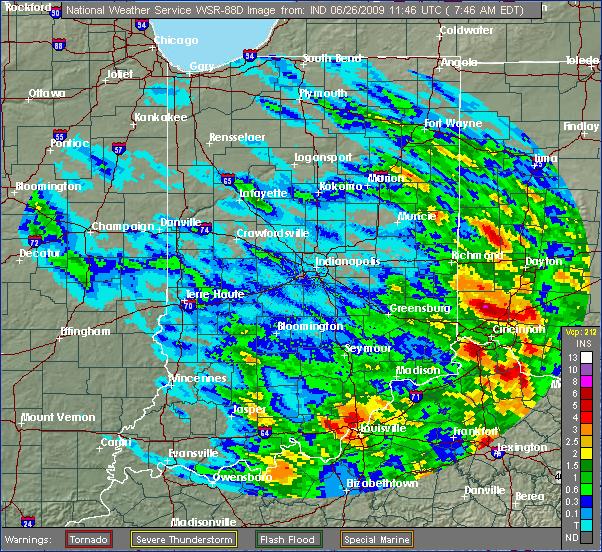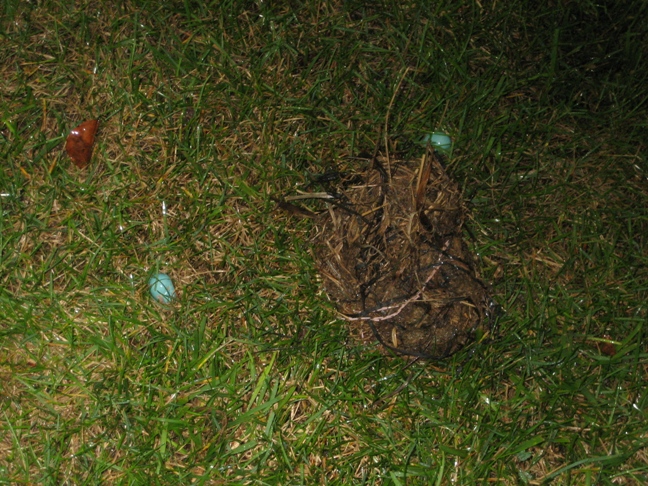
2009-06-26 0800: The sprinkler system deviltry continues. I ran the system yesterday, anticipating hot weather yesterday and for the rest of the week. So as it happens, I was woken up early this morning by a lot of lightning, from an approaching band of thunderstorms. We had several thunderstorms in succession over about three hours, which brought a lot of rain as well as vivid lightning. When I got up this morning at 7:30, I found 5.3 inches (13.4 cm) of rain in my rain gauge. Here is a storm total precipitation radar. (This is the Indianapolis radar; the Louisville radar is down.)

2009-06-22 1300: It was supposed to be hot today (90 F, or 32 C), so I thought it would be good to run my sprinkler system today. After it completed its cycle, a cluster of thunderstorms came through our area, and I got 2.3 inches of rain (53 mm).
2009-06-19 0930: I've finally gotten around to cleaning up this web site, so that my postings for 2009 are sorted by month in separate pages. See below for a link to the index for that archived material.
2009-06-19 0930: Yesterday morning, we had a severe thunderstorm. It had an unusual amount of lightning, nearly continuous (which is what you get with tornadic storms). It had lashing wind—the local news reported gusts of 70 mph in locations near me, and half my neighbor's maple tree came down. And it had torrential rains; I had 1.8 inches in my rain gauge. But when I walked around my house to check for any damage, I found something very sad: The robin's nest in the tree in my front yard had been blown out of the tree, and it and three blue eggs were in my lawn. I had seen the robin on the nest, and I was waiting for the chicks to hatch. I tried to put the nest back, but it was falling apart, and two of the three eggs were damaged. So I left them on my lawn for nature to deal with.

2009-06-18 0800: The New York Times has a telling article this morning, Slump Dashes Oregon Dreams of Californians, that explains much of what has happened in Oregon in the last ten years. The economy in Oregon had a real estate bubble largely fueled by California's real estate bubble; Californians were able to sell their houses for large amounts of money and use the proceeds to move to Oregon and buy homes there. However, in many cases, they moved to Oregon without getting jobs there first. Now the collapse of the real estate and construction industries have left these Californians high and dry, contributing to the unemployment numbers in Oregon: above 12%, second only to Michigan. The problem is particulary bad in the town of Bend, a logging town that became a retirement and resort town, as described in the article (before the boom years, it had "poverty with a view"). One interesting thing mentioned in the article is the resentment by Oregonians against Californians, who are blamed for the real estate bubble and the real estate crash. As a member of the Oregon diaspora, I am aware that this resentment has existed for many decades. In the early 1970s, according to legend, a governor of Oregon placed a billboard at the California-Oregon border that said "Please come visit, but please don't stay". In those days, a slogan appeared on bumper stickers: Don't Californicate Oregon.
2009-06-09 2230: The New York Times has an article, College in Need Closes a Door to Needy Students, about Reed College, to the effect that Reed has been forced to make a terrible decision: to make admissions decisions based in part on students' ability to pay for their education. It was a choice between that or to increase the average class size, and thus dilute one of the things that makes Reed an exceptional college, or draw down their endowment, which would imperil the college's survival if the recession is protracted. But this greatly distresses me, since when I attended Reed thirty years ago, I received a lot of financial aid (due in part to a prolonged unemployment of my father). I am extremely grateful to have had what I realize is a great privilege. It pains me to think that this opportunity will be denied students who deserve it but cannot experience it through no fault of their own.
I do however take comfort that I teach at a college that is both very accessible (the tuition is far lower than that charged by schools like Reed) and of high quality. Students who go to Reed are highly motivated and highly able; they are there because they want to be challenged and they want to learn. But many students at IU Southeast are no different, and if they seek the right programs and instructors, they will also be challenged and will learn. This is reflected in the outstanding students I have had in recent years who have gone to strong graduate schools in mathematical sciences. And our new student housing is enriching student life on our campus.
2009-06-09 1430: An old friend posted a remarkable column on his FaceBook page, a eulogy for the slain Wichita abortion provider Dr. George Tiller, written by Rabbi David N. Young. (This appeared on the web site for the Religious Action Center of Reform Judaism.)
2009-06-07 1500: In Portland, I read another book on religion: The Desire of the Ever-Lasting Hills: The World Before and After Jesus, by Thomas Cahill. I enjoyed this book. He begins with a brief but vivid account of the career of Alexander the Great, both to introduce the political world of the time of Jesus, and to show how different the moral and ethical landscape of that world is from our own. He then introduces Jesus and the early Christian movement from several rather different perspectives: The gospels of Mark and Matthew, the Apostle Paul and his writings, the narrative Luke/Acts, and the fourth Gospel, produced by what he refers to as the Johannine Community. The cumulative picture he draws is consonant with other relatively theological liberal portrayals of Jesus: who he was, what the original generation of Christians believed, and how modern Christian doctrines (the atonement theology and the Trinity) grew from the early Christian communities' need to understand the terrible loss of their Teacher and their experiences of him after his death. He concludes with a profile of a contemporary youth movement in Italy that is trying to follow Jesus through charity and peace-making. Cahill's treatment is decidedly sympathetic; at times, his tone borders on the devotional. Indeed, it becomes clear he is a believer in at least the resurrection—late in the book, he argues that the Shroud of Turin is genuine. (I take it for granted that this artifact is a medieval forgery; in an end note, Cahill is careful to acknowledge that the status of the Shroud remains controversial and that it is not a good idea to base one's faith on it.)
I am now reading the fourth book in Cahill's intended seven-volume series The Hinges of History, his Sailing the Wine-Dark Seas: Why the Greeks Matter. (The Desire of the Ever-Lasting Hills is the third volume of this series; the first two volumes are How the Irish Saved Civilization and The Gift of the Jews, both of which I have read.) I thought this might be a pleasant book for my plane trip back from Portland. I haven't finished it yet, but (so far) it is enjoyable. It is functioning as a nice summary of the freshman humanities course I had back in the fall of 1977. Cahill begins with a brief summary of Greek prehistory (the Minoan and Mycenaean civilizations). He credits the Greeks with creating our modern alphabet, transforming earlier Semitic phonetic scripts into a system of writing suitable for high literature. He discusses the Iliad and the Odyssey to detail the foundations of Greek culture. He continues with their innovations in drama, theatre and in politics. I'm now to what promises to be the most interesting chapter: Greek philosophy. My retired colleague Bill Rumsey, a philosophy professor, liked to say that the Greek philosophers did not necessarily have the right answers but they asked the right questions. As a mathematician, I am well-aware of the fact that modern mathematics was introduced by the Greeks—surely as important as any of their contributions to western civilization. (Much, if not most, of the geometry known to the Greeks, such as the Pythagorean theorem, was known a millennium earlier by the Egyptians and the Babylonians; but it was the Greeks who constructed a system of postulates and axioms from which all theorems can be deduced using logic. Euclid's Elements, which dates to the third century BCE, reads like modern mathematics.) I'll report on anything of particular interest in Cahill's treatment.
One thing to beware of in Wine-Dark Seas: Cahill is quite explicit in describing various aspects of Greek sexuality, and he uses familiar vulgarities to this end. The book has several pages of figures, including very graphic Greek art showing orgies involving same-sex as well as opposite-sex penetration. Cahill says that the Greeks practiced social segregation of the sexes, and he asserts that homosexuality is common in cultures that practice this kind of segregation (including, he says, modern Muslim cultures). The implication that sexual orientation is more plastic than commonly accepted today—instead of being largely biological in origin—is jarring if not controversial.
Added 2009-06-09 1600: Continuing to read Wine-Dark Seas, I find in his discussion of Socrates and Plato a mention of an old Greek story or myth concerning love: according to the story, originally humans beings were paired, with two sets of sexual organs. But the gods cut human beings into two halves, with each half containing one set of sexual organs. So now all human beings seek their other half, in order to be complete again. But this story also contains an explanation for homosexuality: Sometimes, the original being consisted of two halves both of the same gender, so the people involved will seek their own gender to feel whole. This is a striking story because it seems to indicate that the Greeks thought of homosexual love as a trait.
Cahill has another interesting discussion: Plato and the Christian Church. Plato of course long pre-dated Christianity (he wrote in the 4th century BCE). But he arrived at an understanding of ethics and philosophy that was close to the medieval Christian Church, which was especially remarkable considering that the Greeks were a society where (as Cahill colorfully puts it) everyone is either a "fucker or a fuckee." Consequently, according to Cahill, we have very few surviving works by most Greek authors, but we have everything Plato wrote.
2009-06-01 1345: Yesterday, I enjoyed a wonderful service at St. Gabriel's Episcopal Church, where my brother Tom is a deacon. This was Pentecost Sunday, and the coming of the Holy Spirit was celebrated with red and yellow confetti, twirling spiral kites, and the hymn "Hail Thee Festival Day"; many parishioners wore bright red. My sister-in-law Kathy read the Lesson (Acts 2:1-11) in French, while other parishioners read it in other languages; Kathy said they had six languages being read.